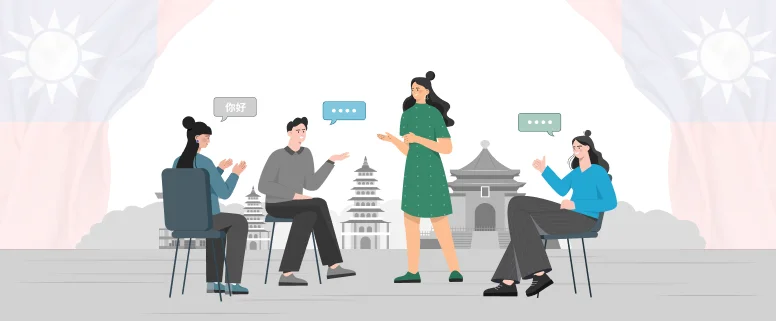Background
Taiwan was once a part of China and gained independence in 1949 during a civil war against the communist government. Today, the country, though similar to China, has very different economic policies. In a free economy like Taiwan, they determine prices of goods and raw materials based on fair market value with little to no government interference. Taiwan’s technology industry, commonly referred to as the Silicon Valley of Asia, constitutes a significant portion of its economy. Despite being considered a Chinese state, Taiwan operates under full autonomy. The land features several mountainous ranges, most of which are over 3,000 meters high.
Taiwan food resembles Chinese and Japanese cuisines. A reason why it has so many flavors and is very popular around the world. Street food is a big part of Taiwanese culture. Many of the dishes made in Taiwan are through ancestor recipes.
Our topic today focuses mostly on the languages spoken in Taiwan. So here is the list of spoken languages and we will talk about some of them in more detail later in the blog.
- Mandarin
- Formosan languages
- Mandarin
- Hokkien
- Hakka
- Matsu
- Wuqiu
- Sign language
- Amis
- Atayal
- Bunun
- Kanakanavu
- Kavalan
- Paiwan
- Puyuma
- Rukai
- Saaroa
- Saisiyat
- Sakizaya
- Seediq
- Thao
- Truku
- Tsou
- Tao
- Indonesian
- Tagalog
- Thai
- Vietnamese
- Malay
- English
- Indonesian
- Japanese
- Korean
- Tagalog
- Thai
- Vietnamese
The list above includes official, national, indigenous, foreign, and immigrant languages. Taiwan has a very rich history spanning centuries and a variety of dialects and languages explain that diversity very well.
Table of Content
Does Taiwan have a language called the Taiwanese Language?
Well the answer is yes, but it may not be yes for much longer. There is a dialect of Hokkien known as Taiwanese, which is also called a dialect of Chinese. Though it is only a dialect, the differences between them are vast. So vast that Mandarin dialect speakers and Taiwanese dialect speakers cannot have an understandable conversation between them. The differences are enough that you can compare them to Spanish vs Italian.
But why is the Taiwanese dialect dying?
The Taiwan area has had a very gruesome and beautiful history. The gruesome part was being under Japanese and KMT control for an accumulated time of 100 years. During this time the Taiwanese dialect was banned. There are more reasons, but this was the heaviest nail in the coffin.
A very small group of people can speak Taiwanese and they are an aging bunch. Most of the Taiwanese speakers were born in or before the 1950s. Future generations mostly spoke in Mandarin and Hokkien. The younger generations do know certain phrases or words. Almost enough to say a few sentences, but conversationally would be a rare phenomenon.
The Taiwanese language is heading towards extinction. There is little to no serious effort to revive the language and nor is it taught in schools. However, there is no doubt that the Taiwanese language will be a testament to Taiwan’s cultural legacy.
Most Commonly Spoken Languages of Taiwan
Many people have the notion that a country’s name always has to do something with the name of the spoken language of that place. This may be true in many cases like people of Japan speaking Japanese, Germany speaking German, France speaking French, and so on. However, there are many countries where this phenomenon does not remain constant. You can take examples from most Arab countries and African ones. Our topic is an Asian example. Though the people of Taiwan are called Taiwanese people, their official languages have different names.
The most spoken language in Taiwan is Mandarin which is also the official language of the People’s Republic of China. Almost 84% of the Taiwanese population speaks the language. Moreover, Hokkien comes second on the list of: what language is spoken in Taiwan?
Here is a List of Languages of Taiwan
A majority of the Taiwanese population are descendants of the Chinese Han people. So it is no surprise any spoken Taiwan language is highly influenced by this history. You would be surprised to know that the indigenous population only accounts for 2% of the population. Further invasion of the Japanese and the KMT people influenced the culture and languages. Now that some of the background is clear let’s take the more common languages into focus.
Mandarin
The TMT government declared Mandarin Chinese as the official language of Taiwan in 1945. It still remains their official language to this day. The majority of people that migrated from China in the 1940s was due to political and military pressures. It was honestly not a good time to be Chinese. Many people even moved back to China as things got easier. But their influence has been left behind. Mandarin has overtaken every aspect of Taiwan, becoming the official government language and the medium of education and business.
Hakka
Once a very popular language, today it is only spoken by a small village in Taiwan. The speakers are known as the Hakka group, an ethnic population from China similar to the Han Chinese. This group lived in close quarters and communicated in the Hakka language which is why the language survived for so long. The language is barely spoken today but remains alive where the Hakka group used to be. Their descendants have kept the language alive.
Japanese
Taiwan was under Japanese control for almost half a century. China lost the Island to Japan in 1895. The Japanese ruled Taiwan until 1945 and regularly maintained their efforts to promote the Japanese language on the Island. A majority of the older generation speaks Japanese even today. Though Mandarin remains dominant among the older generation and younger generation alike. Japanese is considered an elite language and many business students are taught the language. Moreover, many students also visit Japan during their education.
Aboriginal Taiwanese
Only about 2% of the populace in Taiwan can speak Aboriginal Taiwanese. These people are the speakers of the Aboriginal Taiwanese language. They have been in Taiwanese land for more than 6000 years. A total of 16 Aboriginal Taiwanese languages have existed in history. 10 of which are now extinct and others are dying out. Taitung and Hualien have the most speakers in Taiwan.
English
It may come as no surprise that English would also wind up on the list somehow. English is the most common language in the world. It is a part of most education systems and Taiwan is no different in this regard. Due to the global business requirements and diplomacy, English can be learned even at a university level. However, the people of Taiwan are among the least proficient English speakers in the world. It comes as no surprise that China and Taiwan are close rivals in this matter.
Taipei MRT Announcement Languages
The Taipei MRT system is among the best in the world. People use it to travel anywhere in Taipei and it is one of the best benefits of living there. The underground train system has announcements made in 5 languages. Announcements have always used Mandarin, Taiwanese, Hakka, and English. However, since half of the tourists in Taiwan are Japanese, the Japanese language is now also utilized for announcements.
What does the Future Hold?
Well, many of the smaller languages may begin to die. Japanese will remain very much intact because of historical and current facts. Mandarin and Hakka will continue to dominate as the most commonly spoken and understood languages. We can also expect some improvement in English speaking among the Taiwanese people. The impact of social media and content productions like movies. Moreover, platforms like Netflix, Facebook, Fiver, and more will promote the English language among the younger population. Although people can easily consume content in Taiwanese languages. Preference changes are likely to occur due to the global English supply.
Conclusion
Taiwan has quite the past and diverse populations within it. The interesting topography and their love for technology are refreshing, to say the least. While Taiwan gained independence from China, the Chinese influence on them was the greatest. Though both have different forms of government and economic policies. Culture and language have many similarities.







